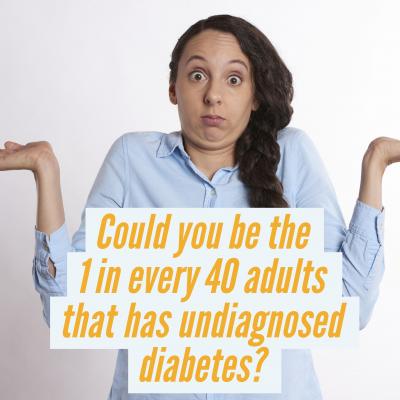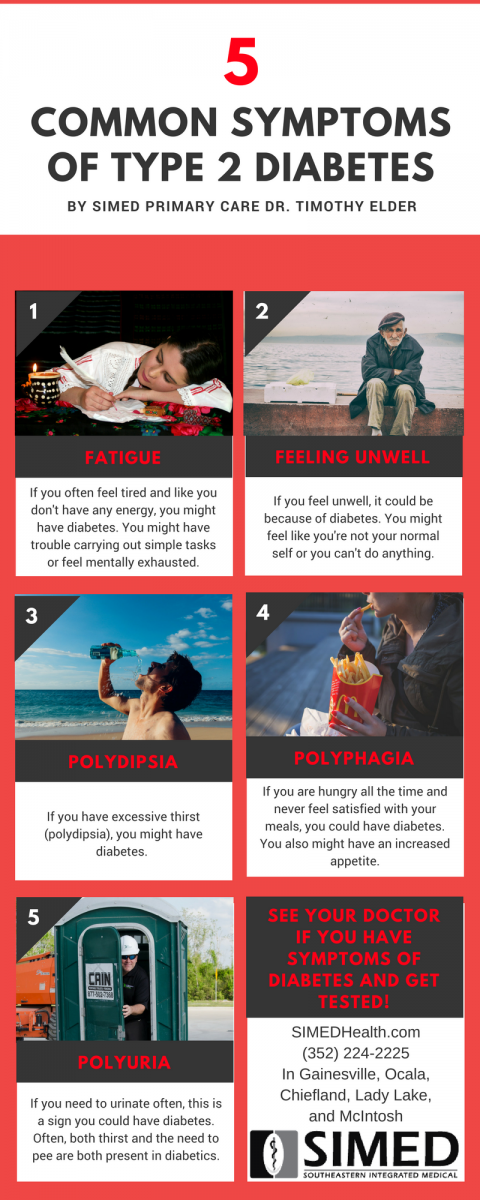
More than 1 in every 10 adults 20 years and older have diabetes. Unfortunately, about one-fourth of adults with diabetes go undiagnosed. Learn the symptoms, risk factors, and treatment for diabetes and find out how you can prevent it with SIMED Primary Care Dr. Timothy Elder on World Diabetes Day (Nov. 14).
What is Diabetes?
Diabetes is a disease you can get when your blood glucose level is too high. The person has above normal blood sugar levels and might have difficulty managing their blood glucose levels.
There are two types of diabetes: Type 1 and Type 2. Type 1 diabetes is typically an insulin dependent diabetes and usually has a younger onset. Type 2 diabetes is more common and usually diagnosed in adulthood. We will be focusing on Type 2 diabetes.
What are the common symptoms of Type 2 diabetes?
The most common symptom Dr. Elder sees is fatigue or people coming in and saying they’re “just not feeling right.” A lot of people feel poorly and can’t explain why.
Other symptoms called the 3Ps include:
1. Polydipsia – increased thirst and fluid intake
2. Polyphagia – increased appetite
3. Polyuria – the need to urinate frequently
People might think they’re urinating a lot because they’re drinking more, but usually both happen as a result of diabetes. When the blood stream has too much glucose, the glucose can spill into the urine. To balance it out, the body will add more water to the urine. As a result, the person then needs to urinate more and feels more dehydrated.
How can I prevent or regulate diabetes?
People can prevent Type 2 diabetes by:
1. Improving their diet and eating a low carb diet
Eating a low carb diet is one of the biggest issues. People with diabetes potential or who have diabetes should avoid foods that break down easily into simple sugars. When the carbs break down, they add to the sugar problem that already exists.
2. Exercising
You can do any prolonged endurance cardio exercise. Current guidelines recommend at least 150 minutes of exercise a week which ends up being about 30 minutes a day. If you have decreased activity, you could develop acute metabolic syndrome which increases your risk of heart disease, stroke, and diabetes.
Something as simple as fast walking can be very good exercise. Your muscles will actually take sugar out of your bloodstream and won’t need insulin to do that. Your biggest muscles are your glutes and your thighs; if you’re walking, you’re making those muscles work and using up excess the sugar in your body.
3.Maintaining an ideal body weight
Fat affects your insulin’s ability to work as it should. With less fat, your insulin should work better.
What are the risk factors for Type 2 diabetes?
People usually get Type 2 diabetes as a result of lifestyle choices, and Type 2 diabetes can usually be prevented by changes in diet and exercise. More people are getting diabetes at a younger age because of the obesity epidemic in the United States.
Risk factors include:
- Being overweight
- Family history with diabetes
- High blood pressure
- Sedentary lifestyle
- High cholesterol
What should I do if I think I have diabetes?
If you’re showing signs of diabetes, you should let your doctor know. Your doctor might do a basic glucose test or a urine dipstick to see if there is glucose in your body. The tests are easy, quick, and affordable. You can get them done right in the office.
What happens if I’m diagnosed?
When you’re first diagnosed, you’ll usually do baseline labs to make sure your kidneys are functioning well and can tolerate the medicines you’d need to start. You might also get another lab done called the hemoglobin A1C test which we consider a vital sign for diabetes. This lab test can tell us the average glucose level over the past three months.
You’ll also receive basic diabetes education from your SIMED doctor. The doctor will set you up so you can do your own glucose level tests at home. You will usually then be started on basic medicine. You will need to visit your physician to try to make your goal and keep your hemoglobin A1C at less than 7 percent. At SIMED, we typically see a patient back as soon as a few weeks after being diagnosed to review how the patient is adjusting and address new questions they’ll have accumulated since the initial visit.
What is a good glucose level?
A normal glucose level is between 80 and 100. Usually, diabetes is diagnosed with a hemoglobin A1C. In that situation, if the person’s level is over 6.5%, they can be diagnosed with diabetes.
What medication will I need to take when I’m diagnosed?
Usually you will start off taking oral medication. The medication amount depends on your glucose level. The biggest fear patients have is that they’ll have to be on insulin, but initially that’s not usually the case. The oral medications currently available work very well, and if people make appropriate diet and lifestyle changes, they may never need to be on insulin. Some oral medications are generic, and one of them is actually free at a lot of drug stores.
If I’m diagnosed, can I eventually get rid of the disease?
While you can’t entirely remove the disease, it can go into remission if you control your glucose levels with weight loss, lifestyle modifications, diet, and exercise. A few patients of Dr. Elder have been successful at keeping their diabetes in remission.
What happens if I don’t regulate my diabetes?
Left untreated or unmanaged, people with diabetes can have increased risk for heart disease, stroke, blocked arteries in the legs, nerve damage in the hands/legs which limits sensation or causes burning pain, and damage to the retina causing vision loss. Untreated diabetics can also develop damage to their kidneys leading to the need for dialysis. It’s best to get tested and start treating the diabetes if you show symptoms.
What else should I know if I have diabetes?
If you have diabetes, you should see your doctor every 3 months or as recommended. Also, make sure you are up to date on your vaccines.
If you believe you might have diabetes, visit a SIMED Primary Care doctor today in Gainesville, Ocala, Chiefland, Lady Lake, or McIntosh to get tested. You can call 352-224-2225 or request an appointment online.To schedule an appointment with Dr. Elder in Gainesville, call 352-372-8202 or fill out an appointment form online.
Read More: Healthy Eating Tips with a diabetes diet
Read More: Cooking Hacks for a Healthy Heart with recipe resources for diabetics
Follow us on Facebook or Twitter for more informative articles.